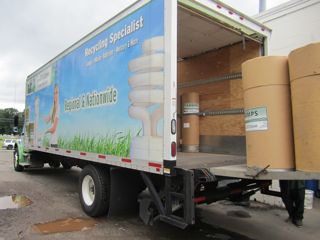How Do You Know That Your E-Waste Is Being Properly Recycled?
What happens to unwanted office computers and other electronics? While there are no federal regulations for electronic waste, there are many cities across the U.S. that have passed laws making it illegal to discard e-waste with regular trash. So how do you make sure that your e-waste is being properly recycled?
 The Great Forest team recently visited NLR (Next Level for Recycling) in Connecticut, one of a handful of facilities that specializes in recycling electronics (including computers, monitors, laptops, cell phones, MP3 players, digital cameras) and universal waste (including fluorescent bulbs, mercury containing devices and rechargeable batteries.)
The Great Forest team recently visited NLR (Next Level for Recycling) in Connecticut, one of a handful of facilities that specializes in recycling electronics (including computers, monitors, laptops, cell phones, MP3 players, digital cameras) and universal waste (including fluorescent bulbs, mercury containing devices and rechargeable batteries.)
NLR is specially permitted to transport, store and process these materials, which contain toxic heavy metals. Everything they pick up is recorded and they issue certificates of recycling that show the chain of custody to their facility, where they ensure appropriate disposal.
“The certificate of recycling is key,” says Amy Marpman, Great Forest’s director of recycling services. “Make sure the vendor you contract with for removal of universal and e-waste provides a manifest or certificate that includes the materials picked up, and specifies what facilities those materials go to.”
At NLR, Great Forest got to see the process first hand. Fluorescent light bulbs, which contain mercury, were fed into a giant machine that separated the metal end caps from the glass, and captured the mercury vapor. Computers and other electronics were separated into their base components.
The metals and electronic components are sold to manufacturers for reuse in new materials. Glass, however, is recycled in an innovative partnership NLR has with Connecticut’s Department of Transportation.
“It was great to learn that 100% of the glass from the light bulbs they process are used as filler for paving highways in Connecticut,” says Great Forest consultant Caroline Chappell.
So the next time you are in Connecticut, look down. You may be driving on one of your old light bulbs.
